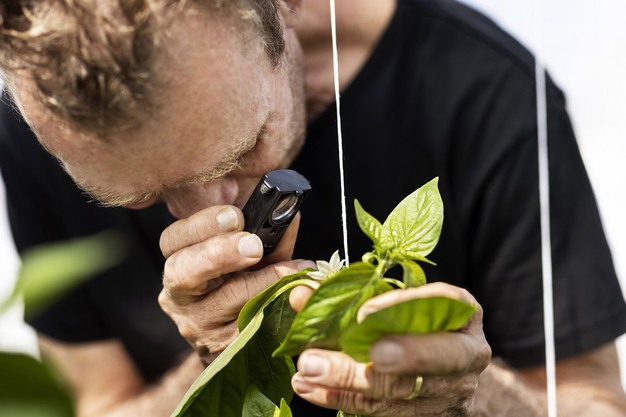The first season of the '100% Green Grown' practical project in vegetable cultivation has been completed. Seven ambitious greenhouse vegetable growers have spent the past months in a practical pilot exploring the possibilities of growing fruit vegetables completely without chemicals. The pilot runs for three years and the first growing season has been positive. The seven growers will confidently continue next season, with new knowledge and experiences bringing the goal one step closer.
Due to increasing social pressure and a rapid decrease in the number of available resources, the joint goal is to profitably grow the crops sweet pepper, tomato, aubergine, and cucumber in an integrated resilient cultivation system with green, organic, and technological solutions within three years. It involves the entire system, i.e. including climate, substrate, and water.
This project, initiated by Federatie Vruchtgroente Organisaties (FVO) and supported by the specialists of Hoogendoorn Growth Management, LetsGrow.com, Van Iperen, Van der Knaap Groep, Koppert and Rijk Zwaan, is an important step towards a future of fully green cultivation.
The following growers participated: Frestia (pointed pepper), Agro Care (traditional tomato), Bryte (traditional tomato), Van Duijn De Jong (aubergine), Fitterstee (Traditional cucumber), Drenthe Growers (traditional cucumber), and Reijm & zn. (block pepper). Besides the 7 pilots, a practical trial of block peppers is also running at Botany.

Learning points first season
With intensive scouting and early pest control with biology, prevention proved better than cure as the most important lesson. When a disease and/or pest was detected, an appropriate green agent was targeted in the affected part. If this was not sufficient and the crop was in danger of being seriously affected by the disease or pest, a chemical agent was used very selectively and targeted to prevent further damage. This approach ensured that significantly fewer chemicals were used in the first season.
However, the use of technology and innovative solutions remains very important to keep costs manageable. Think banker planting systems and insect netting. All participating pilot growers are excited to continue, share their knowledge, and put this new knowledge into practice. Based on experiences from the first season, concrete improvements have been identified that will be implemented next year, such as using organic substrate and adjusting the fertilization schedule.
Besides the seven pilots, there is a practical trial of block peppers at Botany in Horst. Initially, this trial was planned for one year only, but given the valuable learning lessons it was decided to extend it by at least one year.
It looks back on a successful first season. However, the road to full green and economically profitable cultivation remains challenging. And every season is different. But in any case, the first season has provided many valuable insights. Next year, we will build on this with the new knowledge gained.
Cooperation between vegetable and ornamental plant cultivation
The developments surrounding '100% Green Cultivated' are not only taking place in the fruit and vegetable sector. Ornamental plant cultivation is also working towards the same objective. Pilots are also running for the crops phalaenopsis, gerbera, kalanchoe, and chrysanthemum. Both sectors are working hard on sustainable cultivation solutions and learning from each other's experiences.
Source: FVO
